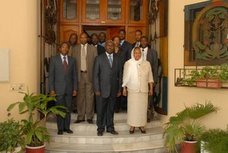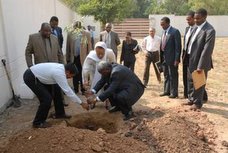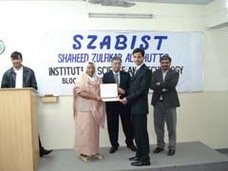KARACHI, Feb 8: Kenya is keen to get assistance from Pakistan in research and technology and would like to benefit from its vast experience in agriculture, particularly irrigation system, to enhance its farm production.
This was stated by Peter Kyalo Kaindi, assistant minister and leader of the 14- member Kenyan delegation, at a luncheon meeting, organised by the Rice Exporters Association of Pakistan (REAP), here on Thursday.
Like Pakistan, he said Kenya’s mainstay is agriculture, and it would like to benefit from Pakistan’s experience and know-how and would allow duty-free import of all categories of plants and machinery related to agriculture and irrigation development.
“There is conscious policy change to look towards East, and Pakistan has been selected to be one of the countries from where Kenya can benefit a lot,” he maintained.
He further said that countries like Pakistan are more flexible and open and carry a lot of consideration for other nations.
Unlike his last visit, the minister said first they visited Islamabad and met a number of ministers, including commerce, investment and agriculture, to boost bilateral trade relations between Pakistan and Kenya.
He said Kenya would welcome assistance from Pakistan in irrigation technology to cultivate its vast barren land.Mrs Mishi Masika Mwatsahu, the high commissioner of Kenya, said Kenya would like to enhance its bilateral trade and would also look to benefit in such areas where Pakistan is well advanced and has developed required know-how.
She stressed the need for having greater trade cooperation between developing nations for the mutual benefit of poor masses.
The Kenyan delegation also comprised chairman Tea Board of Kenya, Dunstan M Nagumo, and its managing director Sicily K Kariuki.
Pakistan is the largest tea importer from Kenya and imported over 33 per cent of its total tea exports.Abdul Aziz Maniya, chairman Rice Exporters Association of Pakistan (REAP), talking to newsmen said the issue of quality and standardisation of rice had been resolved as both the sides have agreed to accommodate each others’ standards.He said Kenya would continue to accept Quality Review Committee (QRC) inspection up to March 15, which would help clear all such consignments which are already on way to Nairobi.
Director-General Pakistan Standards and Quality Control Authority (PSQCA) Abdul Ghaffar Soomro said that there was a difference of opinion in the Kenya Bureau of Standards (KBS) and those of PSQCA.
However, it had been agreed that the KBS which had only three grades for rice would adopt 1 to 6 quality standards of the PSQCA for import of rice from Pakistan.
He further stated that presently the PSQCA had 1 to 9 grades for rice which are internationally registered, but the KBS had reduced the grades to three and in order to sort out the problem, both the sides have agreed to follow 1 to 6 grades of the PSQCA.
However, he said a memorandum of understanding (MoU) would be signed between the two countries for certification of rice and tea as laid down by the WTO conditions.
Mr Soomro said under the WTO conditions, it was necessary to certify the quality and standard of a product entering the country, therefore, lab test and certification would be done by the PSQCA once both the countries enter into MoU.
However, chairman, Rice Exporters Association of Pakistan said that the QRC would inspect rice meant for export to Kenya, but from time to time the PSQCA would be monitoring the working of the QRC.
News.pakistway.com




















